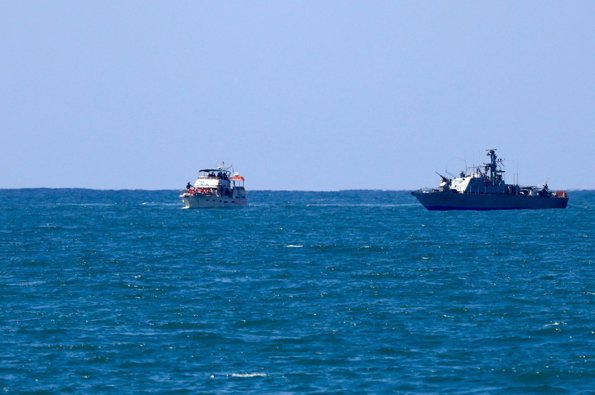
Israel Intercepts Final Gaza Flotilla, Detains 400+
The Israeli navy captured the Marinette, completing its interception of the Gaza aid flotilla and leading to mass detentions.
Ashdod / Mediterranean Sea — In a dramatic maritime confrontation, Israeli forces intercepted the last vessel of a pro-Palestinian flotilla attempting to breach the naval blockade of Gaza, leading to the detention of over 400 international activists. The seizure of the Marinette, accompanied by earlier captures of 41 other ships, has triggered widespread global protests and intense debate over Israel’s enforcement of its sea blockade.
Authorities say all detained individuals are being held in the port city of Ashdod pending deportation, while the flotilla’s organizers vow international pressure to demand their release. This incident marks one of the largest collective maritime detentions in recent memory.
The Interception: 42 Vessels, One Final Stand
A coordinated naval operation
According to Israeli official statements, the naval forces launched a 12-hour mission to intercept what they described as a mass attempt to breach the blockade. The flotilla included 42 vessels, and Israeli forces say they boarded and neutralized all of them, ultimately bringing the ships and their occupants to Ashdod for registration and processing.
The final vessel, Marinette, was intercepted approximately 79 kilometers off the Gaza coast in the early morning hours, making it the last ship to fall under Israeli control.
Organizers of the Global Sumud Flotilla later confirmed via social media (X) that all activists were secure and in good health at Ashdod. Among the detainees, Turkish officials say 48 Turks were aboard; Greek organizers also reported that 11 Greek nationals began a hunger strike protesting what they termed an “illegal” detention.
Israeli framing and response
Prime Minister Benjamin Netanyahu lauded the naval forces for a “highly professional and efficient” operation, claiming they foiled a “delegitimization campaign” against Israel by preventing dozens of vessels from penetrating the Gaza coastal area.
The flotilla had embarked in early September, laden with symbolic humanitarian goods and political messaging, with the intention of challenging Israel’s long-standing sea blockade of Gaza.
Supporters of the mission point out that the fleet included notable figures such as climate activist Greta Thunberg, activist and Mandela family member Mandla Mandela, and French-Palestinian MEP Rima Hassan.
Global Outcry: Protests and Diplomatic Ripples
Mass demonstrations worldwide
The flotilla’s interception sparked waves of protest across Europe and beyond. In Barcelona, about 15,000 protesters rallied; Rome saw 10,000 in the streets. Paris saw some 1,000 demonstrators, Dublin hosted hundreds, and protests also erupted in Berlin, The Hague, Tunis, Brasília, and Buenos Aires.
In Italy, unions organized a national general strike in solidarity, prompting transport and labor disruptions.
Demonstrators carried signs reading slogans like “Free Gaza,” “Break the Siege,” and “Israel Occupation = Genocide,” demanding that governments impose sanctions or diplomatic pressure on Israel.
International reactions
Several governments condemned Israel’s interception and called for the immediate release of detainees. Turkey’s Foreign Ministry denounced the acts as “state terrorism,” while Iran and South Africa also lodged formal objections, accusing Israel of violating international law.
Israel, for its part, has begun deporting detainees, including four Italian parliamentarians, and insists the detentions are administrative rather than punitive, consistent with its policies toward past flotilla intercepts.
Notably, Israel’s National Security Minister Itamar Ben-Gvir visited the detention center and publicly taunted activists, labeling them “terrorists.”
Legal, Humanitarian, and Political Angles
Blockade legality and human rights concerns
Israel maintains that its naval blockade of Gaza, in effect since 2007, is justified by security needs—particularly to prevent arms smuggling into Hamas-controlled territory.
Critics counter that the blockade constitutes collective punishment of Gaza’s civilian population, inhibiting essential goods and humanitarian access. Interceptions of unarmed civilian missions, they argue, may violate international humanitarian law and the right to free passage in high seas. (Past precedent includes the 2010 Mavi Marmara raid.)
Human rights groups have raised concerns about how detainees will be treated and the conditions of detainment, particularly in Israel’s detention facilities such as Ketziot.
Political signaling and strategic leverage
From Israel’s perspective, the dramatic interception serves both security and messaging goals—framing the flotilla as a destabilizing campaign while reaffirming control over maritime zones. Netanyahu’s public praise of forces underscores that intent.
For flotilla organizers and pro-Palestinian activists, the mission carries symbolism: a direct challenge to Gaza’s isolation and international attention to the humanitarian crisis. The participation of globally visible figures amplifies that narrative.
Politically, this event could intensify pressure on European governments to take stronger stances on the Gaza war and may impact domestic pro-Palestinian movements.
What Could Happen Next
- Mass deportation or phased release Most detainees may be deported within days, following precedent. Some may resist or challenge deportation on legal grounds. Governments of detainees’ countries will likely press for consular access.
- Court challenges and diplomatic friction Legal challenges could focus on detention conditions, procedural fairness, or claims that Israel overstepped under international law. States whose citizens were detained may escalate diplomatic protests.
- New flotilla attempts Organizers have indicated additional convoys are already underway. The interception may deter some, but it may also galvanize further efforts and escalate maritime confrontations.
- Policy debates and UN involvement International bodies like the UN may vote on resolutions or condemnations. The flotilla incident will likely feed into wider debates on Gaza access, arms trafficking, and war accountability.
Why did Israel intercept in international waters?
Israel contends that the blockade extends to certain maritime zones and that any vessel attempting to breach it—even in international waters—is subject to interception, especially if carrying cargo or personnel linked to the Gaza conflict. Critics challenge that interpretation as overreach.
What is “Global Sumud Flotilla”?
The term “Sumud” is Arabic for “steadfastness” or resistance. The Global Sumud Flotilla (GSF), launched in 2025, aims to break Gaza’s blockade via civilian maritime action, uniting NGOs, activist coalitions, and civil society from multiple countries.
Are these activist missions legal?
That is contested. Israel views them as threats to maritime security. Activists argue their mission is humanitarian and peaceful, claiming rights under maritime law and protest tradition. The precise legality depends on location, intent, and force used.
What happens to detained activists?
They are currently held in Ashdod and processed for deportation. Some may be released; others could be subject to administrative detention proceedings.
Could this lead to violence or escalation at sea?
Yes—there’s risk of confrontation if future flotillas challenge naval forces directly. Israel may respond with stronger enforcement, and activists may escalate tactics.
Final Assessment
The interception of the Global Sumud Flotilla represents more than a naval enforcement action—it is a flashpoint in the Gaza war narrative, combining humanitarian optics, maritime law, and symbolic protest. By detaining hundreds of international activists, Israel has forced global attention back onto the blockade’s moral, legal, and political dimensions. The success or fallout of this operation will depend on how states respond, how detainees are treated, and whether future flotillas escalate the confrontation at sea.
Source: Wikipedia AP News Reuters Al Jazeera






